On and Off the Hill
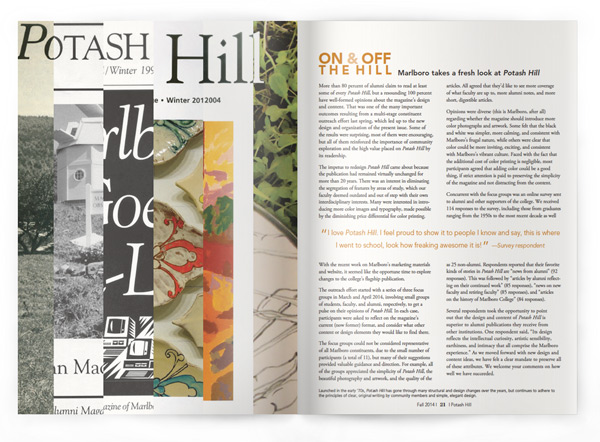
Marlboro takes a fresh look at Potash Hill
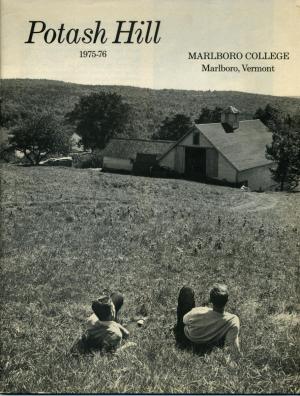 More than 80 percent of alumni claim to read at least some of every Potash Hill, but a resounding 100 percent have well-formed opinions about the magazine’s design and content. That was one of the many important outcomes resulting from a multi-stage constituent outreach effort last spring, which led up to the new design and organization of the present issue. Some of the results were surprising, most of them were encouraging, but all of them reinforced the importance of community exploration and the high value placed on Potash Hill by its readership.
More than 80 percent of alumni claim to read at least some of every Potash Hill, but a resounding 100 percent have well-formed opinions about the magazine’s design and content. That was one of the many important outcomes resulting from a multi-stage constituent outreach effort last spring, which led up to the new design and organization of the present issue. Some of the results were surprising, most of them were encouraging, but all of them reinforced the importance of community exploration and the high value placed on Potash Hill by its readership.
The impetus to redesign Potash Hill came about because the publication had remained virtually unchanged for more than 20 years. There was an interest in eliminating the segregation of features by areas of study, which our faculty deemed outdated and out of step with their own interdisciplinary interests. Many were interested in introducing more color images and typography, made possible by the diminishing price differential for color printing. With the recent work on Marlboro’s marketing materials and website, it seemed like the opportune time to explore changes to the college’s flagship publication.
The outreach effort started with a series of three focus groups in March and April 2014, involving small groups of students, faculty, and alumni, respectively, to get a pulse on their opinions of Potash Hill. In each case, participants were asked to reflect on the magazine’s current (now former) format, and consider what other content or design elements they would like to find there.
The focus groups could not be considered representative of all Marlboro constituents, due to the small number of participants (a total of 11), but many of their suggestions provided valuable guidance and direction. For example, all of the groups appreciated the simplicity of Potash Hill, the beautiful photography and artwork, and the quality of the articles. All agreed that they’d like to see more coverage of what faculty are up to, more alumni notes, and more short, digestible articles.
Opinions were diverse (this is Marlboro, after all) regarding whether the magazine should introduce more color photographs and artwork. Some felt that the black and white was simpler, more calming, and consistent with Marlboro’s frugal nature, while others were clear that color could be more inviting, exciting, and consistent with Marlboro’s vibrant culture. Faced with the fact that the additional cost of color printing is negligible, most participants agreed that adding color could be a good thing, if strict attention is paid to preserving the simplicity of the magazine and not distracting from the content.
Concurrent with the focus groups was an online survey sent to alumni and other supporters of the college. We received 114 responses to the survey, including those from graduates ranging from the 1950s to the most recent decade as well as 25 non-alumni. Respondents reported that their favorite kinds of stories in Potash Hill are “news from alumni” (92 responses). This was followed by “articles by alumni reflecting on their continued work” (85 responses), “news on new faculty and retiring faculty” (85 responses), and “articles on the history of Marlboro College” (84 responses).
Several respondents took the opportunity to point out that the design and content of Potash Hill is superior to alumni publications they receive from other institutions. One respondent said, “Its design reflects the intellectual curiosity, artistic sensibility, earthiness, and intimacy that all comprise the Marlboro experience.” As we moved forward with new design and content ideas, we have felt a clear mandate to preserve all of these attributes. We welcome your comments on how well we have succeeded.
President Ellen announces final year
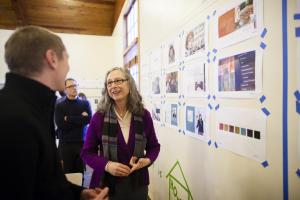 In April, Ellen McCulloch-Lovell announced that she intends to step down from the presidency in June 2015, after serving for 11 years. Ellen’s tenure has been marked by a significant increase in the college’s endowment, an improved campus landscape, increased visibility of the graduate and professional studies programs, and national advocacy for the liberal arts and sciences.
In April, Ellen McCulloch-Lovell announced that she intends to step down from the presidency in June 2015, after serving for 11 years. Ellen’s tenure has been marked by a significant increase in the college’s endowment, an improved campus landscape, increased visibility of the graduate and professional studies programs, and national advocacy for the liberal arts and sciences.
“This is a difficult decision to make, as I love Marlboro, its intensive teaching and learning, its mission, the value of our work here, the college community, and my relationship with the dedicated trustees, donors, and friends of this institution,” Ellen says. “Everything I’ve been able to accomplish at Marlboro has been with the collaboration and support of this remarkable intellectual and creative community.”
“We are sad to see Ellen step down after so many years of dedicated service,” says Dean Nicyper ’76, chairman of the board of trustees. “Because of her successful and tireless efforts over the past ten years, the college is much stronger than it was when she joined us in 2004. She placed the college on significantly firmer footing organizationally and financially, for which we are all grateful.”
Stay tuned for more complete coverage of Ellen’s legacy at Marlboro in the next issue of Potash Hill.
Local colleges form cooperative
In February, representatives from six local colleges met at the Marlboro College Graduate Center to sign a memorandum of understanding launching the Windham Higher Education Cooperative (WHEC). The MOU between the colleges, the first of its kind in Vermont, establishes a cross-registration agreement that allows students to take courses at other institutions, as well as a shared internship program.
“We wanted, first of all, to benefit our students, and offer a wider array of programs,” says Ellen McCulloch-Lovell, Marlboro president. Other colleges in the cooperative include Landmark College, Vermont Technical College, Union Institute, School for International Training, and Community College of Vermont. “We also want to work hand-in-hand with local economic development. We have to understand our roles as some of the largest employers in the county.”
One of the goals of the WHEC is to link student internships with local businesses, thereby benefiting economic development in the region and encouraging locally educated students to stay local. Students at each of the six institutions can expect to see an increase in paid internship opportunities, thanks to a $60,000 grant from the Vermont Department of Labor, as well as more opportunities to receive academic credit.
Beautiful Minds take campus by storm
In April, a diverse assemblage of 23 teenagers visited Marlboro for a symposium and the culmination of the second annual Beautiful Minds Challenge. Symposium attendees were the finalists in the challenge to come up with the most creative answers to the prompt: “Take a road less traveled. Make something that shares your journey.”
“The students who came to the symposium had a great time, and had a transformative experience they will not soon forget,” says Ariel Brooks, director of non-degree programs. Participating students met one-on-one with faculty, attended a class, and presented their “road less traveled” submissions to a public audience. They also learned creative problem solving through improvisation with Jodi Clark ’95, director of housing, and examined the concept of “journeys” in a round-table discussion with philosophy professor William Edelglass.
“This was one of the most amazing experiences in my life…I can’t wait to be a student here,” says Karuna, from Tennessee. Symposium participants came from as close as Vermont and as far as California, Hawaii, and even South Korea. Eight challenge participants applied to Marlboro as a result of the symposium, and all were accepted for the fall 2014 term.
“There really are like-minded people in the world that want the things I do from school,” says Alek, from Minnesota.
“Even though we came from such different places and backgrounds, I think we all relate to each other, and I wouldn’t have expected that before the symposium,” says Louisa, from Kentucky.
“The best experience of my life. Thank you,” says Saron, from Washington, D.C.
Perhaps a high school student in your life will benefit from the Beautiful Minds Challenge this year, for which the prompt is “Create something out of destruction. Share what you learned.” Send them to minds.marlboro.edu for details on how to apply.
Movies from Marlboro goes to Nantucket
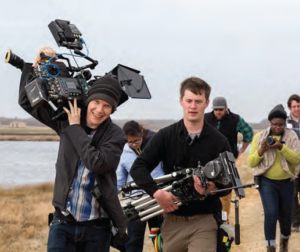 Following the success of the first Movies from Marlboro film intensive, film professor Jay Craven again assembled a team of 30 college students (from 10 colleges) and 20 professionals last spring semester to produce a feature film. This year the hands-on practicum shot a film on Nantucket Island, based on Pierre et Jean, Guy de Maupassant’s 1887 story of a family strained by secrets revealed and illusions shattered.
Following the success of the first Movies from Marlboro film intensive, film professor Jay Craven again assembled a team of 30 college students (from 10 colleges) and 20 professionals last spring semester to produce a feature film. This year the hands-on practicum shot a film on Nantucket Island, based on Pierre et Jean, Guy de Maupassant’s 1887 story of a family strained by secrets revealed and illusions shattered.
“Maupassant’s novel broke ground in the late 19th century for its complex psychological characterizations,” says Jay. “It was cited as an influence by writers including Tolstoy and Nabokov, and Henry James called it ‘Maupassant’s masterly little novel’ for its potent themes.”
While Maupassant’s novel was set in Normandy, the film adaptation, called Peter and John, will be set in 19th-century Nantucket. The cast includes 2014 Golden Globe winner Jacqueline Bisset, Emmy winner Gordon Clapp, Christian Coulson, Shane Patrick Kearns, and Spanish actress Alicia Sanz in her U.S. feature film debut.
This year’s Movies from Marlboro program started in January with an expedition to the Sundance Film Festival, followed by seven weeks of study, training, and pre-production work on the Marlboro campus. Participants then moved on to Nantucket for seven weeks of pre-production and production that fully immersed students in the culture and practice of an ambitious film shoot.
“During our 14-week Marlboro film intensive, I saw students reach beyond their grasp to show remarkable strength, solidarity, and stamina, combined with a growing mastery of dozens of new skills, across the board,” says Jay.
One student told Jay she felt “worthy” for the first time in her college experience, because she had been relied upon to provide meaningful participation (and hard work) for something larger than herself. Another talked about experiencing “good stress”—the kind that comes from doing something new, important, nourishing, and engaging, while still under pressure to perform.
“Our completion of the Peter and John shoot marks an important milestone, mostly for the 14-week educational part of the program, which I believe was successful,” says Jay. “Our second big milestone will be to determine whether we have made a good and compelling film. That measurement will have to wait until we’ve completed post-production.”
The previous Movies from Marlboro production, Northern Borders (Potash Hill, Summer 2011), premiered to a sell-out crowd at Brattleboro’s Latchis Theater last year, launching a 100-town tour of New England. “This project is as ambitious for its educational goals as it is for the production we mount,” says Jay. “I believe that this year’s session added to what we accomplished in 2012. And I’m excited to imagine further development.”
College rises to Real Food Challenge
“I am thrilled to be a part of the solution to our troubled food system,” says Benjamin Newcomb, chef manager at Marlboro through Metz Culinary Management. In April, Ben and President Ellen signed the Real Food Campus Commitment, joining more than 100 colleges and universities across the country. The commitment promises that Marlboro will procure at least 20 percent of the food consumed on campus from local or community-based, fair, ecologically sound, and humane food sources— “real food”—by 2020.
“Colleges like Marlboro have to show leadership in our communities by modeling ways to support ecologically sustainable, humane, and socially equitable food systems,” says Ellen. The primary goal of the Real Food Challenge is to shift $1 billion of existing college and university food budgets away from industrial farms and junk food and toward real food. “Investing in real food not only benefits the daily lives of our students, but also fosters community by supporting the livelihoods of family farmers and other local producers.”
Marlboro’s commitment includes initiating a student-led assessment of campus food procurement using the Real Food Calculator, a tool that uses independently verifiable criteria in four categories: community-based/local, fair, ecologically sound, and humane. The challenge also includes a commitment to adopt a comprehensive real food policy, with a multiyear action plan and annual benchmarks.
“The Real Food Challenge permits us to create a fair, sustainable food culture that celebrates the student, the local farmer, and the best of what New England agriculture has to offer—farm to table,” says Ben. The signing of the commitment was followed by a community dinner of mostly regional or ecologically sound foods, part of Marlboro’s events leading up to Earth Day.
Cambodia connection continues
 Marlboro students and faculty have taken three service-learning trips to Cambodia in the past five years, but their commitment to sustainable development projects in the Southeast Asian nation does not end there. In May, participants in the last trip, led by visual arts faculty members Cathy Osman, Tim Segar, and John Willis (The Marlboro Record, Spring 2014), presented a three-day information and fundraiser event in the dining hall about their ongoing relationship with Cambodian communities.
Marlboro students and faculty have taken three service-learning trips to Cambodia in the past five years, but their commitment to sustainable development projects in the Southeast Asian nation does not end there. In May, participants in the last trip, led by visual arts faculty members Cathy Osman, Tim Segar, and John Willis (The Marlboro Record, Spring 2014), presented a three-day information and fundraiser event in the dining hall about their ongoing relationship with Cambodian communities.
“This was an opportunity for other members of our community to look beyond the cozy green hills of Vermont and support the good work we contributed to on our trips to Cambodia,” says John Willis, photography professor. The group that went in January traveled to Champon Chhnang, Pursat, Siem Reap, and other communities, where they visited schools and participated in service projects, such as water quality testing led by Tim Segar and senior Theresa Chockbengboun. They are quick to differentiate this work from recent reports of disreputable orphanages in Cambodia and groups raising money for development projects there under false pretenses.
“We raised enough money to build a latrine building for the Khmer Children’s Education Organization (KCEO) school, in the rural village of Ang,” said John. It’s the first latrine they’ve had at the school, which hosts 145 students as well as many other local youths each day before and after they attend the government school. “We also raised some money for the Massachusetts Cambodian Water Project’s work, which provides rural villagers access to clean drinkable water.”
Building on this event, John, Cathy, and junior Matthew Czuba, with assistance from other participants and KCEO’s founding director, are developing a website to continue raising funds for the KCEO school. Students there attend classes in everything from English and Khmer language to computer skills and hygiene. Many of the students are on full scholarship, including some young Buddhist monks, and the rest pay on a sliding scale according to family ability. The school has been essentially self-funded, thanks to founder Marin Him and his family, who have dedicated their lives to the facility’s operation. The new website will allow the school to grow and flourish by raising awareness, seeking support, and promoting KCEO’s mission.
To learn more, or to support Marlboro’s relationship with the KCEO school, go to khmerchildren.org.
Events
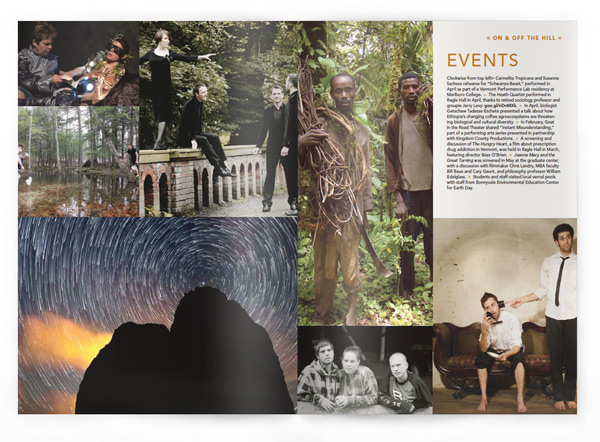
Clockwise from top left: Carmelita Tropicana and Susanne Sachsse rehearse for “Schwanze-Beast,” performed in April as part of a Vermont Performance Lab residency at Marlboro College. • The Heath Quartet performed in Ragle Hall in April, thanks to retired sociology professor and groupie Jerry Levy. • In April, biologist Getachew Tadesse Eschete presented a talk about how Ethiopia’s changing coffee agroecosystems are threatening biological and cultural diversity. • In February, Goat in the Road Theater shared “Instant Misunderstanding,” part of a performing arts series presented in partnership with Kingdom County Productions. • A screening and discussion of The Hungry Heart, a film about prescription drug addiction in Vermont, was held in Ragle Hall in March, featuring director Bess O’Brien. • Joanna Macy and the Great Turning was screened in May at the graduate center, with a discussion with filmmaker Chris Landry, MBA faculty Bill Baue and Cary Gaunt, and philosophy professor William Edelglass. • Students and staff visited local vernal pools with staff from Bonnyvale Environmental Education Center for Earth Day.
Focus on Faculty
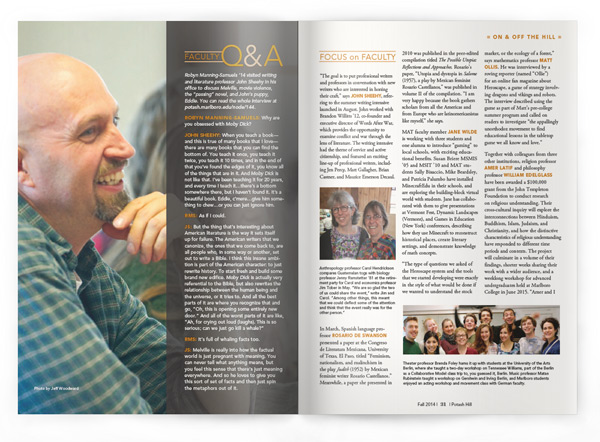
Faculty Q & A
Robyn Manning-Samuels ’14 visited writing and literature professor John Sheehy in his office to discuss Melville, movie violence, the “passing” novel, and John’s puppy, Eddie. You can read the whole interview.
Robyn Manning-Samuels: Why are you obsessed with Moby Dick?
John Sheehy: When you teach a book—and this is true of many books that I love— there are many books that you can find the bottom of. You teach it once, you teach it twice, you teach it 10 times, and in the end of that you’ve found the edges of it, you know all of the things that are in it. And Moby Dick is not like that. I’ve been teaching it for 20 years, and every time I teach it…there’s a bottom somewhere there, but I haven’t found it. It’s a beautiful book. Eddie, c’mere…give him something to chew…or you can just ignore him.
RMS: As if I could.
JS: But the thing that’s interesting about American literature is the way it sets itself up for failure. The American writers that we canonize, the ones that we come back to, are all people who, in some way or another, set out to write a Bible. I think this insane ambition is part of the American character: to just rewrite history. To start fresh and build some brand new edifice. Moby Dick is actually very referential to the Bible, but also rewrites the relationship between the human being and the universe, or it tries to. And all the best parts of it are where you recognize that and go, “Oh, this is opening some entirely new door.” And all of the worst parts of it are like, “Ah, for crying out loud (laughs). This is so serious; can we just go kill a whale?”
RMS: It’s full of whaling facts too.
JS: Melville is really into how the factual world is just pregnant with meaning. You can never tell what anything means, but you feel this sense that there’s just meaning everywhere. And so he loves to give you this sort of set of facts and then just spin the metaphors out of it.
Focus on Faculty
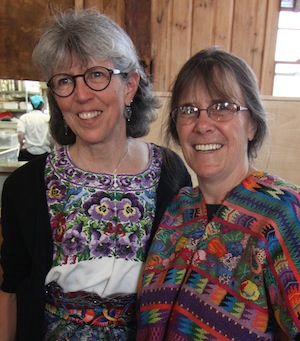 “The goal is to put professional writers and professors in conversation with new writers who are interested in honing their craft,” says John Sheehy, referring to the summer writing intensive launched in August. John worked with Brandon Willitts ’12, co-founder and executive director of Words After War, which provides the opportunity to examine conflict and war through the lens of literature. The writing intensive had the theme of service and active citizenship, and featured an exciting line-up of professional writers, including Jen Percy, Matt Gallagher, Brian Castner, and Maurice Emerson Decaul.
“The goal is to put professional writers and professors in conversation with new writers who are interested in honing their craft,” says John Sheehy, referring to the summer writing intensive launched in August. John worked with Brandon Willitts ’12, co-founder and executive director of Words After War, which provides the opportunity to examine conflict and war through the lens of literature. The writing intensive had the theme of service and active citizenship, and featured an exciting line-up of professional writers, including Jen Percy, Matt Gallagher, Brian Castner, and Maurice Emerson Decaul.
In March, Spanish language professor Rosario de Swanson presented a paper at the Congreso de Literatura Mexicana, University of Texas, El Paso, titled “Feminism, nationalism, and malinchism in the play Judith (1952) by Mexican feminist writer Rosario Castellanos.” Meanwhile, a paper she presented in 2010 was published in the peer-edited compilation titled The Possible Utopia: Reflections and Approaches. Rosario’s paper, “Utopia and dystopia in Salome (1957), a play by Mexican feminist Rosario Castellanos,” was published in volume II of the compilation. “I am very happy because the book gathers scholars from all the Americas and from Europe who are latinomericanistas like myself,” she says.
MAT faculty member Jane Wilde is working with three students and one alumna to introduce “gaming” to local schools, with exciting educational benefits. Susan Briere MSMIS ’05 and MSIT ’10 and MAT students Sally Bisaccio, Mike Beardsley, and Patricia Palumbo have installed MinecraftEdu in their schools, and are exploring the building-block virtual world with students. Jane has collaborated with them to give presentations at Vermont Fest, Dynamic Landscapes (Vermont), and Games in Education (New York) conferences, describing how they use Minecraft to reconstruct historical places, create literary settings, and demonstrate knowledge of math concepts.
“The type of questions we asked of the Heroscape system and the tools that we started developing were exactly in the style of what would be done if we wanted to understand the stock market, or the ecology of a forest,” says mathematics professor Matt Ollis. He was interviewed by a roving reporter (named “Ollie”) for an online fan magazine about Heroscape, a game of strategy involving dragons and vikings and robots. The interview described using the game as part of Matt’s pre-college summer program and called on readers to investigate “the appallingly unorthodox movement to find educational lessons in the tabletop game we all know and love.”
 Together with colleagues from three other institutions, religion professor Amer Latif and philosophy professor William Edelglass have been awarded a $100,000 grant from the John Templeton Foundation to conduct research on religious understanding. Their cross-cultural inquiry will explore the interconnections between Hinduism, Buddhism, Islam, Judaism, and Christianity, and how the distinctive characteristics of religious understanding have responded to different time periods and contexts. The project will culminate in a volume of their findings, shorter works sharing their work with a wider audience, and a weeklong workshop for advanced undergraduates held at Marlboro College in June 2015. “Amer and I are very excited to collaborate with each other and our colleagues elsewhere on this grant, and also with our students here at Marlboro,” says William. “We will be co-teaching a course in the fall that engages the themes of our research and are grateful to be able to share our work with our remarkable students.”
Together with colleagues from three other institutions, religion professor Amer Latif and philosophy professor William Edelglass have been awarded a $100,000 grant from the John Templeton Foundation to conduct research on religious understanding. Their cross-cultural inquiry will explore the interconnections between Hinduism, Buddhism, Islam, Judaism, and Christianity, and how the distinctive characteristics of religious understanding have responded to different time periods and contexts. The project will culminate in a volume of their findings, shorter works sharing their work with a wider audience, and a weeklong workshop for advanced undergraduates held at Marlboro College in June 2015. “Amer and I are very excited to collaborate with each other and our colleagues elsewhere on this grant, and also with our students here at Marlboro,” says William. “We will be co-teaching a course in the fall that engages the themes of our research and are grateful to be able to share our work with our remarkable students.”
French language professor Boukary "Abou" Sawadogo travelled to the Sundance Film Festival in January and published his summary of African-themed and Africandirected films in Film International, an online journal of film culture. In “Africa at Sundance 2014: The Quest for Global Humanity,” Abou focuses on three films that “seek to sound the alarm against oppressive practices and to introduce to the world African figures whose sociopolitical engagement has universal resonance.” On a much lighter note, in April Abou presented his own film, Salut Y’all: African Teachers on the Bayou, followed by a discussion in Apple Tree.
In June, MDO faculty member Kerry Secrest was named Honorary Consul of the Republic of Lithuania to the State of Vermont. “Lithuania has always been a big part of my life, and I am looking forward to helping serve as a bridge between these two parts of the world that I love,” says Kerry, who is a fourthgeneration Lithuanian-American. She grew up going each summer to Camp Neringa in Marlboro, Vermont, founded in the 1960s to preserve the Lithuanian heritage and culture. “The Lithuanian officials I’ve been speaking with are very interested in Vermont’s local food movement and socially responsible businesses, where Vermont is really at the forefront.”
The term “middle class” has been bandied about so much lately that now everyone wants a membership. American studies professor Kate Ratcliff suggests that, thanks to Hollywood, even the rich enjoy identifying themselves as middle class. “The reality created by the commercial mass media is one in which everyone is middle class,” she was quoted in a U.S. News & World Report article titled “What it means to be middle class today.” “Advertising, television and movies all convey a world in which middle- class affluence is an American birthright.”
Last spring, religion professor Amer Latif led a book discussion series on Muslim literature and culture at the Brooks Memorial Library, in Brattleboro. The series, titled Muslim Journeys, included five books ranging from the classic Arabian Nights to the contemporary Minaret, by Leila Aboulela, a novel challenging the perception that Islam oppresses women. In an article in The Commons, Amer said that his goal in leading the series was to “share Muslim voices free from some social issues in order to help others see truths that are transcultural.” The series was presented by Amer on behalf of the National Endowment for the Humanities, as part of their Bridging Cultures initiative.
“The successful entrepreneur is someone who knows what to hang on to and is dedicated to purpose,” writes MBA faculty member Will Keyser. Will’s recent ebook, Telling StartUp Stories: Keep the End in Mind, shares his expertise in “StartUp” storytelling, which he suggests is the most effective form of communication available to the entrepreneur. “Data is necessary, but no longer sufficient to sell your idea for seeking sales, or finding funding,” he writes. Will is working on his second ebook, No Surprises: Essential Numbers for Entrepreneurs.
In May, Spanish language professor Rosario de Swanson was appointed to the Vermont State Advisory Committee for the U.S. Commission on Civil Rights. Rosario was one of 17 Vermonters appointed to the committee, which will conduct reviews on local issues of discrimination or other civil rights infringements in the areas of justice, voting, housing, and education. Having grown up in rural Mexico, and with a rich understanding of Latin American culture and literature, Rosario has a unique perspective to share on civil rights issues in Vermont.
In March, philosophy professor William Edelglass became the new co-director of the International Association of Environmental Philosophy (IAEP), the global forum for wide-ranging philosophical discussions of nature and the human relation to the natural world. The organization publishes the Journal of Environmental Philosophy, and its annual conference is one of the largest in the world on the subject. “IAEP exposes me to an enormous variety of ways of thinking, which helps me in my own curriculum at Marlboro,” says William, who has been co-editor of the Journal of Environmental Philosophy and a “member at large” on the executive committee for two years. “Seeing new ways of approaching nature is important to me.”
“I like chaos,” says visual art professor Cathy Osman. “I like creating a complex, chaotic, multileveled situation, then trying to find an order within that.” In March, she and colleague Tim Segar had a joint show and gallery talk at Greenfield Community College, in Massachusetts. The show combined Tim’s ceramic sculptures covered in roofing tar (“all the rage at Marlboro,” says Tim) with Cathy’s multimedia collages, all held together by Tim’s wall of hanging striped maples. “The wall alters the way you experience the space, and it has a linear relationship to some of the work Cathy is showing in her collages,” said Tim.
Anyone who has been involved with a nonprofit board knows how hard it is to raise money, and how necessary. Drawing on decades of experience, and tapping an expert team of fundraising trainers across North America, MDO faculty member Andy Robinson and his colleague Andrea Kihlstedt have responded to the need with Train Your Board (and Everyone Else) to Raise Money. This practical book contains easy-to-use training exercises for boards of all sizes and sophistication, developing skills that reduce the barriers to fundraising and help boards make their case.
Also of Note
A dance performance created by Marlboro senior Hannah Ruth Brothers ’14 was selected for the gala concert concluding the New England American College Dance Association Conference, held at Boston University from February 13 to 16. The conference was attended by more than 500 students and faculty from 27 New England colleges. Hannah Ruth’s piece, a quintet titled “Landing,” was among the 11 chosen for performance at the gala concert. Hannah Ruth performed the dance with fellow Marlboro students Sophia Romeri ’14, Lily Kane ’13, Erika Klemperer ’13, and Martha Henzy ’13, and music was provided by student Aidan Keeva ’14.
Daniel Kalla ’14 was this year’s recipient of the Engaged Student Award from the Vermont Campus Compact. In addition to serving as head selectperson, member of community court, and resident assistant, Daniel co-facilitated student trips for blood donation and hosted campus conversations on positive relationship communication. He also volunteered as a reparative probation panelist with the Brattleboro Community Justice Center (BCJC) and served on a Circle of Support and Accountability for a former prisoner on probation. “He has been a fantastic supporter of prisoner reentry in our community,” says Larry Hames, executive director of BCJC.
“I deeply admire Marlboro’s tradition of allowing students to take ownership over their futures and supporting them in their journey to become leaders, activists, and informed, thoughtful citizens of the world,” says Beth Ruane, Marlboro’s new library director. Beth joined Marlboro in July, after spending the last four years as a librarian at Skidmore College. Before that, she was librarian at DePaul University for five years. Beth received her B.S. in English from Valparaiso University, an M.A. in English from North Carolina State University, and an M.S. in library and information science from the University of Illinois at Urbana-Champaign.
In March, Marlboro was pleased to welcome Rachel Gravel as the new technical services librarian. “The students here are incredible,” says Rachel, who has a notable passion for cataloging and classification. “They are intelligent, selfaware, and thoughtful, and I love learning about their studies.” Rachel came to Marlboro from Boston, where she is currently finishing her master’s degree in library and information science at Simmons College. She also has a master’s degree in German from Tufts and a B.A. in political science and German from Trinity College.
Lindsay Guido-Williams started as the new career development director at Marlboro in April. She is passionate about helping students pave their way to a career that brings them both happiness and satisfaction. With more than eight years of experience working with individuals on their academic and career development, Lindsay offers strong coaching skills and the ability to support students through self-assessment, career exploration, and job attainment. She has a B.S. in business administration and a master’s in psychology and counseling, and understands how lacking direction in terms of one’s career can affect an individual’s quality of life.
A recent graduate of the Managing Mission-Driven Organizations program, Hillary Boone joined the Marlboro staff as program manager for Benchmarks for a Better Vermont (BBVT) and nonprofit programs communication coordinator. Hillary comes with a firm understanding of Results-Based Accountability (RBA) through coursework and an apprenticeship with lead trainer Anne Lezak. “I’m committed to RBA because it can quickly re-inspire people about their work and the change they can make,” says Hillary. “I’ve been honored to work with nonprofits all over Vermont that are doing really incredible work.”
“My time abroad definitely helped narrow my focus and give me the inspiration that I was looking for,” says Alex Bobella ’15, who spent last spring semester at Kings College London studying religion through a program hosted by Arcadia University. He was energized by the foreign urban landscape, far from the winding woodland paths of Marlboro. “The churches and mosques and temples that I passed in London gave a certain accessibility to the divine, and the historicity of religious worship, that allowed me to focus my studies in religion at Marlboro and understand what exactly it was I wanted to study.”
Jodi Clark ’95, director of housing and also a student in the MDO program, was selected to present a 20-slide “pecha kucha” (look it up) presentation at the Gross National Happiness (GNH) conference in Burlington last May. In her presentation titled “We say I love you all the time in the office. Is that normal?” Jodi explored reinvigorating the workplace by creating a culture of appreciation, trust, accountability, and love. Marlboro graduate faculty member Anne Lezak and Benchmarks for a Better Vermont program manager Hillary Boone were also on the program.
After studying abroad in Morocco for a whole semester, through a School for International Training program titled Journalism and New Media, Julian Harris ’15 decided that it was not enough. He returned to Morocco this summer with renewed focus, so to speak. “I realized that I wanted the photography portion of my Plan to be centered around the concept of the people of Morocco living their daily lives,” says Julian, who is working on a Plan in photography and journalism. Part of his travels included a visit with last year’s Fulbright Arabic Fellow, Abdelhadi Izem.
MDO student Kristy Smith was one of 50 participants at a two-week international peacebuilding conference in Kathmandu, Nepal, hosted by the School for International Training’s CONTACT program. Participants from 13 countries, mostly from southern Asia, worked in teams to examine and understand conflicts afflicting the region, from boundary disputes to conflicts over natural resources. “The primary goal of this conference was to connect a group of people with each other, and to carry these connections back to the work we are doing at home,” says Kristy.
Student Art
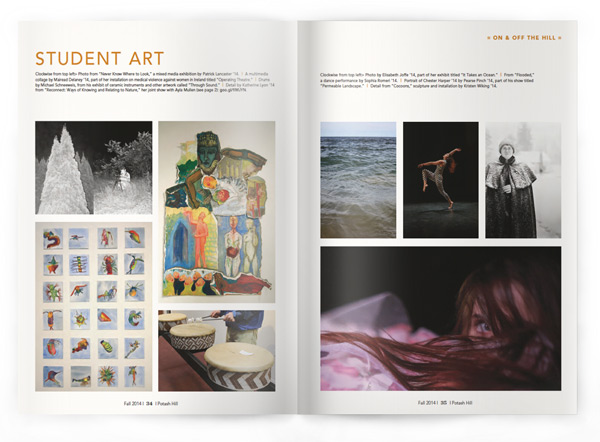
Left page, clockwise from top left: Photo from “Never Know Where to Look,” a mixed media exhibition by Patrick Lancaster ’14. | A multimedia collage by Mairead Delaney ’14, part of her installation on medical violence against women in Ireland titled “Operating Theatre.” | Drums by Michael Schneeweis, from his exhibit of ceramic instruments and other artwork called “Through Sound.” | Detail by Katherine Lyon ’14 from “Reconnect: Ways of Knowing and Relating to Nature,” her joint show with Ayla Mullen.
Right page, clockwise from top left: Photo by Elisabeth Joffe ’14, part of her exhibit titled “It Takes an Ocean.” | From “Flooded,” a dance performance by Sophia Romeri ’14. | Portrait of Chester Harper ’14 by Pearse Pinch ’14, part of his show titled “Permeable Landscape.” | Detail from “Cocoons,” sculpture and installation by Kristen Wiking ’14.
Undergraduate Commencement 2014
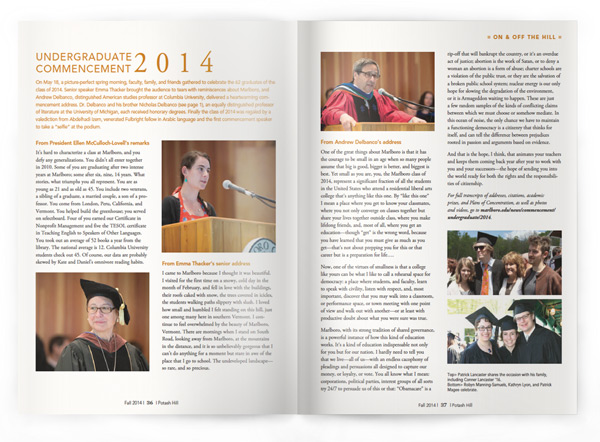
On May 18, a picture-perfect spring morning, faculty, family, and friends gathered to celebrate the 62 graduates of the class of 2014. Senior speaker Emma Thacker brought the audience to tears with reminiscences about Marlboro, and Andrew Delbanco, distinguished American studies professor at Columbia University, delivered a heartwarming commencement address. Dr. Delbanco and his brother Nicholas Delbanco (see page 1), an equally distinguished professor of literature at the University of Michigan, each received honorary degrees. Finally the class of 2014 was regaled by a valediction from Abdelhadi Izem, venerated Fulbright fellow in Arabic language and the first commencement speaker to take a “selfie” at the podium.
From President Ellen McCulloch-Lovell’s remarksIt’s hard to characterize a class at Marlboro, and you defy any generalizations. You didn’t all enter together in 2010. Some of you are graduating after two intense years at Marlboro; some after six, nine, 14 years. What stories, what triumphs you all represent. You are as young as 21 and as old as 45. You include two veterans, a sibling of a graduate, a married couple, a son of a professor. You come from London, Peru, California, and Vermont. You helped build the greenhouse; you served on selectboard. Four of you earned our Certificate in Nonprofit Management and five the TESOL certificate in Teaching English to Speakers of Other Languages. You took out an average of 52 books a year from the library. The national average is 12. Columbia University students check out 45. Of course, our data are probably skewed by Kate and Daniel’s omnivore reading habits.
From Emma Thacker’s senior address
I came to Marlboro because I thought it was beautiful. I visited for the first time on a snowy, cold day in the month of February, and fell in love with the buildings, their roofs caked with snow, the trees covered in icicles, the students walking paths slippery with slush. I loved how small and humbled I felt standing on this hill, just one among many here in southern Vermont. I continue to feel overwhelmed by the beauty of Marlboro, Vermont. There are mornings when I stand on South Road, looking away from Marlboro, at the mountains in the distance, and it is so unbelievably gorgeous that I can’t do anything for a moment but stare in awe of the place that I go to school. The undeveloped landscape— so rare, and so precious.
From Andrew Delbanco’s address
One of the great things about Marlboro is that it has the courage to be small in an age when so many people assume that big is good, bigger is better, and biggest is best. Yet small as you are, you, the Marlboro class of 2014, represent a significant fraction of all the students in the United States who attend a residential liberal arts college that’s anything like this one. By “like this one” I mean a place where you get to know your classmates, where you not only converge on classes together but share your lives together outside class, where you make lifelong friends, and, most of all, where you get an education—though “get” is the wrong word, because you have learned that you must give as much as you get—that’s not about prepping you for this or that career but is a preparation for life….
Now, one of the virtues of smallness is that a college like yours can be what I like to call a rehearsal space for democracy: a place where students, and faculty, learn to speak with civility, listen with respect, and, most important, discover that you may walk into a classroom, or performance space, or town meeting with one point of view and walk out with another—or at least with productive doubt about what you were sure was true.
Marlboro, with its strong tradition of shared governance, is a powerful instance of how this kind of education works. It’s a kind of education indispensable not only for you but for our nation. I hardly need to tell you that we live—all of us—with an endless cacophony of pleadings and persuasions all designed to capture our money, or loyalty, or vote. You all know what I mean: corporations, political parties, interest groups of all sorts try 24/7 to persuade us of this or that: “Obamacare” is a rip-off that will bankrupt the country, or it’s an overdue act of justice; abortion is the work of Satan, or to deny a woman an abortion is a form of abuse; charter schools are a violation of the public trust, or they are the salvation of a broken public school system; nuclear energy is our only hope for slowing the degradation of the environment, or it is Armageddon waiting to happen. These are just a few random samples of the kinds of conflicting claims between which we must choose or somehow mediate. In this ocean of noise, the only chance we have to maintain a functioning democracy is a citizenry that thinks for itself, and can tell the difference between prejudices rooted in passion and arguments based on evidence.
And that is the hope, I think, that animates your teachers and keeps them coming back year after year to work with you and your successors—the hope of sending you into the world ready for both the rights and the responsibilities of citizenship.
For full transcripts of addresses, citations, academic prizes, and Plans of Concentration, as well as photos and videos, go to the Marlboro website.